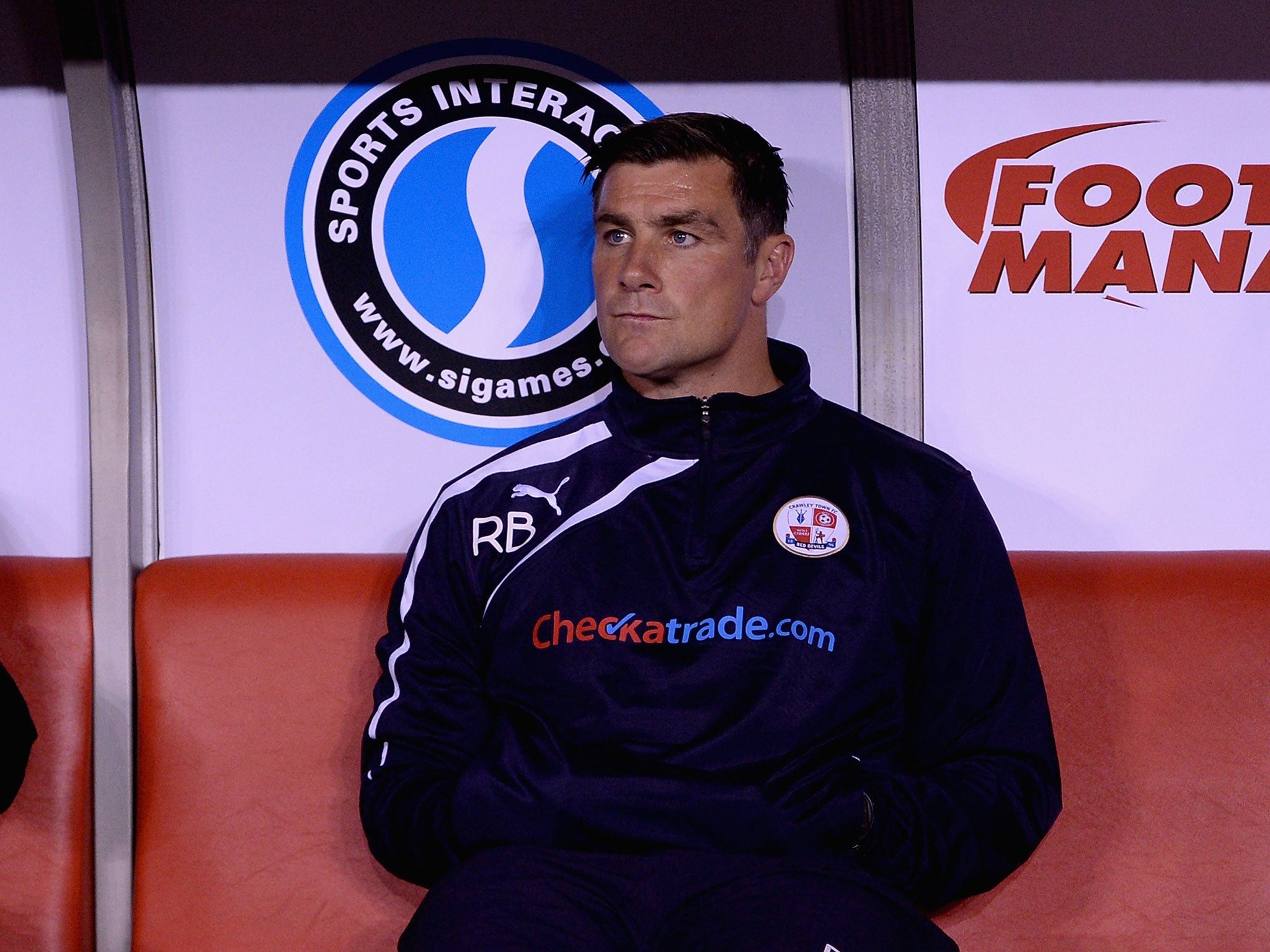Life Beyond the Premier League: Crawley Town’s Richie Barker prizes coach education, and right now he is learning fast

It is often said a manager learns more in the bad times than the good, in which case Crawley Town’s Richie Barker is currently receiving a fast-track education.
The League One side have neither scored a goal nor won a point in four matches and today face an FA Cup first round tie away to Conference North leaders Hednesford which screams ‘giantkilling’.
Whatever the result, however, no one in the Broadfield Stadium boardroom should panic. It is not so long ago that Crawley were themselves the giantkillers and to be mid-table in League One on gates of 3,500 and a budget to match is an achievement to match their draw at Old Trafford.
That was in February 2011. Back then Crawley were a non-league club and Barker was youth-team manager at Bury. Neither had a pedigree that marked them out as worth watching. Now, recent results notwithstanding, both deserve attention.
Their paths through the ranks were very different. While Crawley’s rise was fuelled by anonymous overseas investment, Barker’s is down to hard graft and foresight.
Long before injury forced an end to his playing days he knew he wanted to manage. Many aspiring coaches take notes from the training sessions they experience; Barker went further, much further. He ran a pub team for a year, coached in non-league for a year, then worked evenings at Sheffield United’s academy for four years. Alongside this he qualified up to Uefa A licence (he is taking the Pro Licence now) and took the League Managers’ Association’s management course.
“I decided I would have every qualification I could have by the time I finished playing so if I couldn’t get a job it would not be for lack of them,” said Barker, 38. “You hear so many people say, ‘Right, I’m out of the game, now I’m going to take my coaching badges’. It’s too late by then. I made sure the day the surgeon told me ‘you have to retire’ I could go for a job.”
That day came four years ago after a solid career in the lower leagues, notably with Brighton, Rotherham, Macclesfield and Hartlepool. He had long observed managers as well as their sessions, learning how to do it from the likes of Danny Wilson and Ronnie Moore, and how not to from other, un-named bosses. They also “gave me confidence to think, ‘I can do better.’”
By the time he retired he knew “how I wanted to play, how I wanted to recruit, what players I wanted in certain positions, and what environment I wanted to create”.
What he needed was a job. He found one in Bury’s youth system. Then Alan Knill left for Scunthorpe in April 2011 and Barker became caretaker manager, charged with ensuring a promotion campaign did not falter. He succeeded and got the job permanently. “Without the qualifications I would not have had the opportunity, but nothing beats actually being the manager. The best learning curve I had was those six weeks as caretaker at Bury.”
After he took Bury to a mid-table League One finish, Crawley came calling. It was an easy choice. When he decided to have a crack at the insecure world of management the family decided to make Brighton, his wife’s hometown, their base.
But it was not an easy gig. Crawley made few friends while going from non-league to League One. Big spending allied to Steve Evans’ aggressive management and long-ball football was a toxic combination. But the money tap had been turned off and the club needed to consolidate. Improving the quality of football was seen as a way to retain fans lured by success.
Barker has overhauled the squad and philosophy and begun upgrading the playing infrastructure. Crawley used to train on the park: “We had dogs running on biting the ball, people riding motorbikes across it, and it was always waterlogged.” Now they use a local non-league ground. Small steps, but progress. Tenth last year, they began brightly this season but the squad is small. Despite preventative work, including pilates, injuries happen and form has dipped since Billy Clarke was injured. But Barker is looking long-term, seeking to develop players, build a team, and one day emulate Yeovil. But that takes time and, from the boardroom, patience.
One of Barker’s ambitions is to join the elite group of 1,000-game managers. He has 871 to go and, though young, knows he will need understanding chairmen to get to the landmark and expectation is the manager’s enemy. “If we can stay anywhere near top-half that is success for this club, but at some point I will probably get the sack for not getting in the play-offs”.
Maybe, maybe not. The statistics are grim. Russell Slade, appointed in April 2010, is the division’s longest-serving manager. But look at where Slade’s Leyton Orient are.
Join our commenting forum
Join thought-provoking conversations, follow other Independent readers and see their replies
Comments